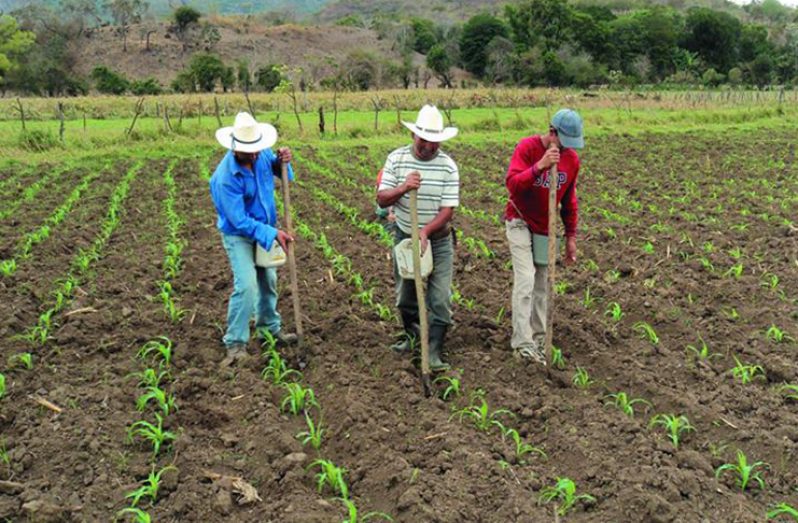THE Inter-American Institute for Cooperation on Agriculture (IICA) under its flagship project ‘Family Agriculture’ contracted the services of a consultation team to engage in a research study on family farming. This study was conducted in Guyana, Jamaica, Haiti and St. Vincent and the Grenadines.
Heading the study was Dr. David Dolly and Mr. Glenroy, with logistical and technical support being provided by IICA.

Wilmot Garnett, IICA’s Representative in Guyana told the Pepperpot Magazine, “The study, Characterisation of Family Farming in Guyana is important and necessary as it helps to outline the features of the family farmer and farming. It has been found that approximately 75 per cent of the farmers in Guyana are ‘family farmers’.
“Thus, the study has identified the constraints and challenges that they as farmers face in their production. The results can be used to plan appropriate agricultural and other support policies that can improve the lives of the farm families and family farming.”
He explained that family farm refers to usually rural, small family-owned farms which may be small scaled that mainly depend on family labour and produce a significant share of their produce for their own food; the surplus sold.
The study targeted Region Five – Mahaicony, Region Two – Tapakuma, Region Nine – Aranaputa, Wowetta, Moco Moca and Region 10 – West Watooka.

CONSTRAINTS AND CHALLENGES
Discussing the report, Mr. Garnett pointed to situations such as an aging farm population and the abandonment or conversion of some farms into non-agriculture use when the farmer becomes too aged to farm as some real challenges; the challenge of the youth not being attracted to or being discouraged from agriculture, coupled with increased migration of youth from rural to urban areas that also pose a challenge to the continuity of family farming. Added to this, he said, is the poor image of farming and agriculture, relative to other economic activities also contribute to the challenges faced.
The study showed women as being marginalised, having limited productive resources while, at the same time, there is the declining vitality of rural areas and high rural to urban drift.

Furthermore, according to findings of the study, farming is not seen or approached as a business; on the other hand, there is limited access to financing and investment, use or adoption of new and improved technologies and with these, limited access to productive labour has been a major challenge in all countries.
“Inadequate marketing and promotion of local products; inconsistent or declining supply and quality of farm products; limited integration of ‘small farmers’ into value chains, (including processing) and inter-sectorial linkages, added to low consideration for good environmental practices and stewardship,” all pose serious challenges to the farmer, as well as farming families.
BENEFITS OF FAMILY FARMING
Speaking on the study, Mr. Garnett said that with succession planning and farming supported by a strong family unit fully involved and invested in the farming enterprise, the issue of ageing farmers will become less acute since successive generations will maintain and build on the farming business leading to continuity of farming through inter-generational family ties and involvement.
He indicated that global experiences suggest an improvement in the integrity of the farm labour force (e.g., greater commitment, trust, improved efficiency). The use of family labour may also minimise the pilfering of resources and output from the farm.
YOUTH
The report showed how young family members will have good reason for wanting to become involved in family farming even as, “…an incentive system built on incentivising each member of the family farm (FF) unit, will improve the perspective and situation of the household head, which will make him or her less likely to steer children away from the farming business and will encourage the children to view the farm as a business entity capable of generating acceptable earnings and status over time.
“Retaining youth through a strong family farming foundation and value system will be a vehicle for real transformation of the sector and for inter-generational development of agriculture,” the study emphasised.
It stated that the expansion of the family farm unit is also facilitated in the same manner as expansion of the family, provided that grown children desirous of starting their own family farming business has access to additional land outside of that which is locked into the family farm
WOMEN FARMERS
According to the study, strong and recognised family farming business structures will go a long way in addressing the issue of barriers to female farmers’ capacity to own assets and leverage same to access financing. It will strengthen the situation for women without necessarily depending on the lengthy legal reform.
Recognition of the importance of each family member within the family farm unit will mitigate the challenges which marginalise women’s access to productive resources.
“This is important to the Caribbean given the extent of female-headed households and the greater tendency for women to be involved in farming and small food processing activities associated with farm output.”
The study posited that women will be assured of a fair share in the family farms assets and returns and will also be afforded the opportunities for continuous self-improvement and empowerment.
“An empowered and positive female farmer will be more inclined to encourage young family members to get involved and continue the family business,” the study assured.
The global experiences, according to the study, will provide sufficient evidence that indicates the strong likelihood that the farm family will be better stewards of sustainable development than other farmers and make better use of resources.
Additionally through the generational influence, ‘family farms’ may be able to sustain cultural traditions and take care of the rural landscape in which they exist according to standards which they may set.
The family may also provide a better platform for natural resource management, including best management practice for climate change. (mercilinburke2017@gmail.com)



.jpg)











